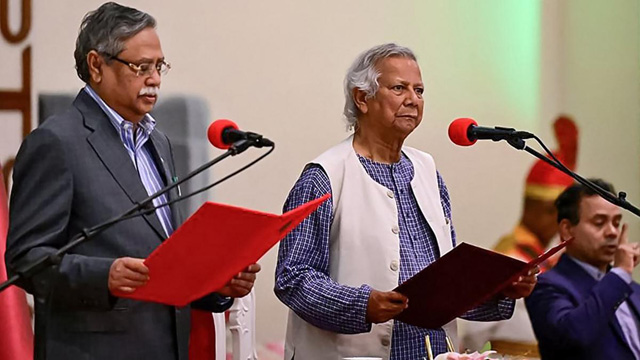
Student leaders Nadid Islam and Asif Mahmud Sajib Bhuiyan join the new dispensation in Bangladesh headed by Muhammad Yunus
DHAKA (TIP): A 14-member interim government in Bangladesh, under the leadership of Noble Laureate Muhammad Yunus, was sworn in on Thursday, August 7, 2024, three days after Sheikh Hasina stepped down as Prime Minister and left the country after mass protests.
President Mohammad Shahabuddin administered the oath to the 84-year-old as the Chief Adviser of the interim government, and the Cabinet members at 9:20 p.m. local time at a ceremony held in Bangabhaban, the official residence of the President.
Military officers, Bangladesh Nationalist Party (BNP) secretary-general Mirza Fakhrul Islam, Jamaat-e-Islami amir Shafiqur Rahman, Jatiya Party chairman Ghulam Muhammed Quader as well as foreign diplomats from the U.K., Japan, China, the Philippines, Iran, Argentina, Qatar, the UAE and the Netherlands were present at the ceremony.
No one from the Awami League, Ms. Hasina’s party, was seen at Bangabhaban.
After Mr. Yunus, 13 out of the 16 advisers of the interim government were sworn in. The Cabinet members are Saleh Uddin Ahmed, Asif Nazrul, Adilur Rahman Khan, Hasan Arif, Tauhid Hossain, Syeda Rizwana Hasan, Brig. Gen. (Retd) M. Sakhawat Hossain, Supradip Chakma, Farida Akhtar, Bidhan Ranjan Roy, A.F.M. Khalid Hossain, Nurjahan Begum, Sharmin Murshid, Md. Nahid Islam (students’ representative), Asif Mahmud Sajib Bhuiyan (students’ representative) and Farooqui Azam.
As Gonobhaban, the Prime Minister’s Office and official residence, remains in shambles after protesters stormed it following the resignation of Ms. Hasina, the state guesthouse Jamuna will be the office and residence of the Chief Adviser.
Sources said a committee will be formed to assess the damage to these two important installations, and renovation will begin soon afterwards.
Earlier in the day, after landing in Dhaka from a trip to France, Mr. Yunus gave an emotional speech, recalling the sacrifices made by students who were met with a heavy-handed response from the Ms. Hasina-led government.
In his speech, he addressed the people of Bangladesh as “one big family” and said the young protesters had given them a “new birth”. However, he condemned the recent violence directed against the country’s religious minorities.
“My first word to you is to protect the country from disorder. Protect it from violence so we can follow the path our students have shown us,” he said.
Restoring stability and stopping anarchy have become immediate priorities as attacks, looting and destructive activities persisted on Thursday in many parts of the country, in the absence of government and enforcement agencies.
However, the Bangladesh Army, alongside other law enforcement agencies, said they would take strict action to stop the ongoing attacks across the country.
Following the newly appointed Inspector-General of Police’s call to return to duty within 24 hours, some police personnel have started to report back, but many others are waiting for security assurances before returning to their posts. Many force members are fearful of further violent reprisals from the public after having opened fire on protesters and the general public under the Hasina regime.
Shamsus Sadat Selim, Additional Secretary at the Ministry of Public Administration, confirmed that all contractual appointments of officials made during the tenure of the recently ousted Awami League government are set to be cancelled. Also, there is a growing demand to remove other officials who benefited from the last government’s tenure from key positions.
Meanwhile, during a regular briefing in Washington on Wednesday, Matthew Miller, the U.S. State Department Spokesperson, said the U.S. believes the interim government should respect democratic principles, the rule of law, and the will of the Bangladeshi people. Mr. Miller also mentioned that they think the interim government will play a vital role in establishing long-term peace and political stability in Bangladesh.
(Agencies)



Be the first to comment